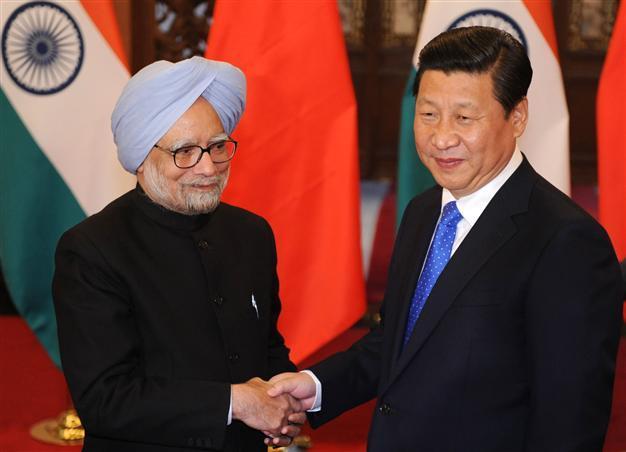China, India sign border defense agreement
BEIJING - Agence France-Presse

Chinese President Xi Jinping (R) shakes hands with India's Prime Minister Manmohan Singh before their meeting at the Diaoyutai State Guesthousein in Beijing on October 23, 2013. AFP Photo
China and India signed an agreement Wednesday on border defense cooperation after a stand-off along their disputed frontier in April fuelled fears of conflict between the Asian giants.
Indian Prime Minister Manmohan Singh, visiting Beijing to seek a breakthrough in the territorial row that has soured relations for decades, witnessed the signing of the pact alongside Chinese Premier Li Keqiang.
The agreement will "help to maintain peace, tranquillity and stability in our border areas", Li said following the ceremony.
No further details were immediately available. It was expected to include provisions for better communications between the two armies, although analysts played down its significance.
Singh told reporters: "We account for 2.5 billion people on this Earth and when India and China shake hands, the world notices." The frontier agreement "will add to the existing instruments to ensure peace, stability and predictability on our borders", he added.
China and India fought a brief war in 1962 and the border between them has never been properly demarcated, although they have signed accords to maintain peace.
In April this year India accused Chinese troops of intruding nearly 20 kilometres (12 miles) into Indian-held territory, sparking a standoff that was only resolved three weeks later when troops from both sides eventually pulled back.
Harsh Pant, of the defense studies department at King's College London, said the agreement was a "significant takeaway" for Singh, but was not likely to resolve substantive differences between them.
"Anything that restores normalcy on the borders is a welcome development though this pact is unlikely to resolve the border row," he said in emailed comments.
Li said the two would hold joint counter-terrorism training in southwest China and "strengthen cooperation to combat terrorism".
China blames "terrorist" groups for incidents in its far western region of Xinjiang, home to Muslim Uighurs, and has in the past linked clashes to groups trained in neighbouring Pakistan.
Delhi and Beijing signed nine agreements in total on Wednesday, including separate memorandums of understanding to strengthen cooperation on transborder rivers and transport.
China is India's biggest trading partner, with two-way commerce totalling $67.83 billion in the last fiscal year, up from $2.1 billion in 2001-02.
But India's trade deficit with its neighbour soared to $40.77 billion last year from just $1.08 billion in 2001-02, Indian figures show.
Singh -- on probably his last trip to China as prime minister -- called the deficit "unsustainable" after his meeting with Li, who said the two countries "agree to pursue trade and mutual investment in a parallel fashion".
"China stands ready to work with India to strengthen cooperation on infrastructure, especially railway construction, and to push forward the establishment of a Bangladesh-China-India-Myanmar economic corridor," Li said.
The proposed land corridor, dubbed a new "southern silk road", would pass through Myanmar and Bangladesh to connect the southwestern Chinese city of Kunming with Kolkata, one of India's largest cities.
